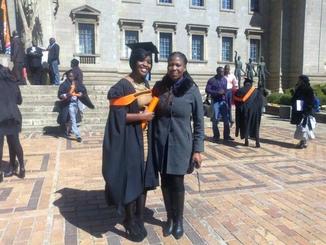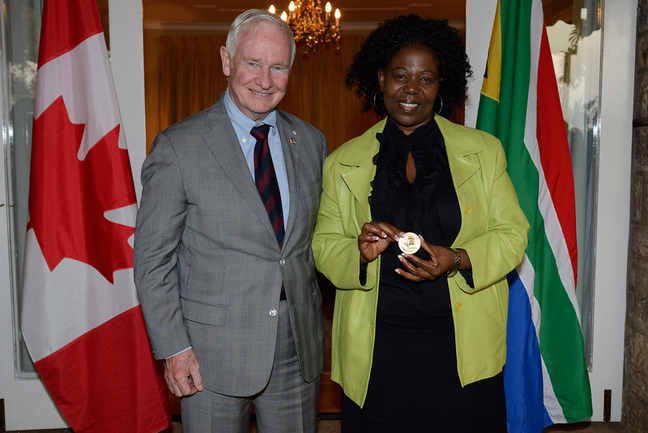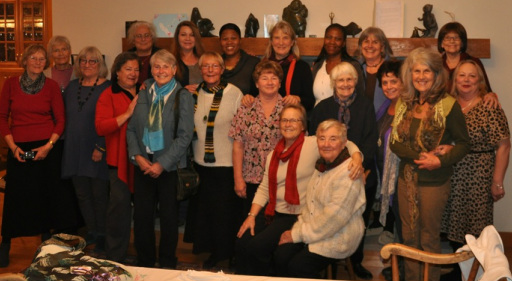|
Overview of the Alex orphans project
Funding and donors
Where our money goes
Program director and community care workers
Health realities and social realities
Education
Baby clothes
Nulazatsche village in Kwazulu Natal
Conclusions
Recommendations
Minde Education Fund Proposal Rationale:
Mandate – The Wakefield Grannies Education Fund may be used for the following learning scenarios:
Operation:
2 Comments
Our Grannies gathered one cold November Friday afternoon at our much loved Molos.
Our Goal? To create 200 warm Hats / Toques for our Gogos and their Grandchildren in Alexander Township, South Africa. A Gogo had written how bitterly cold the last winter was and their homes aren't as well insulated as our Canadian ones. The Children also leave for school very early in the morning and have to either walk or catch taxis and it would be freezing. We also found out that with rolling blackouts in Johannesburg, even the small heaters wouldn't be giving much warmth. So a call went out to Grannies willing to knit, crochet "Hats for Africa". Nothing warms the heart and body like a Canadian Toque lovingly created by Wakefield Grannies and Friends. The project evolved and Sally introduced an idea her Granddaughter had: We could hook Hats on a Loom. This is how the "Hooking Grannies" began and we gathered at Molos every Friday at 12h00 and with Hopie's weekly invite to Grannies to join her and other Hookers for delicious soup and mellow company had more Grans arriving. We also had those wonderful Friends and Relatives that knitted or loomed at home. Thank you Mama Lemieux, Mary Alison and Alex, Judy, Joanne (who has supplied the Grannies with so much fabric and wool over the years), Nora, Ellie and Jackie. All this would not have been achieved without you. To our Wakefield Grannies who made this all happen ..... Thank you and Mercedes, who patiently taught, picked up stitches and organises the left over bits and pieces which will be used for future projects. Grannies, we reached 218 Toques! Some really large and some tiny but most in between sizes and the leave Canada for South Africa with Eadie Jane end May. Well Done Everyone ! Every single day, month or year I share my painful and heart-breaking experiences about my work in Alexandra Township with everyone especially my funders. But today the experience I am about to share with you made me a very strong young woman and helped me to do my work with passion, love and pride. Couple of months ago I met a young sick woman who was in terrible pain, her screams and uncontrolled diarrhea drove everyone away, her family and friends. When I first met her, I was horrified, I wanted to scream with her but something in me said “go ahead speak to her and save her from this pain”. I didn’t know what to say to her, she was in terrible pain, every part of her body was in pain and she was crying terribly.
I held her hand tight and I said to her, my friend, please don’t push this pain away, even this virus, just let it be there. She kept on screaming and I felt like screaming with her but immediately I remembered my late fathers’ words saying that never cry in front of someone who needs your help instead encourage her to live. I looked at her thin bony cheeks and said to her, my friend can you feel that somehow, beyond your pain, beyond your fear and beyond your isolation, without trying to change them even a little, that somehow miraculously beyond all these things, somewhere there is place of peace and even ok-ness. Can you feel that? I asked her. Can you let yourself, without pushing any of the other pain and fear away? I asked her to melt into that place of peace and remember that somehow beyond reason, beyond anything she was ever been told, that somehow what is happening to her is ok and that beyond all this there is peace. Her throat made a sound of affirmation, a kind of grunting as I moved deeper into a wordless participation with her. Beyond who I thought I was and beyond whom she imagined herself to be, we met in just being. The power and the connection of that moment were evident as our mind melted away. For that moment it felt like the whole world was composed of love. For nearly half and hour with our hands held tightly together, our eyes locked into space of vast love and caring, slowly, that face that had been drawn in such pain and distress melted into a smiling face. The hard lines of the chin and the gritting of her teeth slowly dissolved into a gentle smile, she looked at me and said yes, it is okay. When I return the following morning, I asked her how was today, she said very different, the pain is still there but it is very different. I looked at her face and said; how your dying feeling today was? She looked at me and said; if death was the peace that we shared yesterday, then I am ready to go. I told her that there is so much more than this AIDS, even this aloneness, if she can just trust. She did hold my right hand and said I know, I feel much better now. I told her that she must always know that she has access to that place of peace within herself. She looked different but the truth was that her journey of life was nearly over even-thou she had the courage to live few more days. As I was about to leave her room I said to her, we are in this together and never forget that. As I was leaving, I felt that my heart was filled with the immensity of her love as she let go of her pain and experiencing herself as something greater than her body. I promised her that I will see her the next day and she smiled and said yes, it is okay, so much love. What I didn’t want was for her to die alone in that tiny room because the fear of dying was bucking her terribly. The following morning when I arrived she was struggling to breath and her brother phoned the ambulance but took time to arrive. I did encouraged her to relax, she was terrified and I said to her, do you remember that place of peace, go to it, let God breath for you, let each breath go into His heart, I repeated it over and over again, I can’t remember how many times now, I was shaking but caressing her brows as she began to be quiet, eventually becoming very still until she breathed out one last soft breath and melted quietly out of his tormented body. Her letting go felt like that of a little girl. As she dissolved out of this lifetime of pain and withdrawal, I continued to encourage to encourage her to go to God, I said to her, my friend trust the mercy that await you. I reminded her of that place of peace. As I stroke her forehead after her final breath, I said to her, merge with the heart Jesus now, let go into the light of your sacred nature. Few minutes later she died. For me it was quiet a sad, special and interesting experience of my life as I never thought I will help someone by easing her pain and it was an experience that I felt might worth making some notes in my diary. To me it felt like I knew her all my life even-thou we met couple of days before she died. May her spirit rest in peace. As we will be celebrating June 16 (youth day) and Mandela day soon, the lives and death of our hero’s and those who has fought so hard for our democracy, we remember their lives and death with pride because they fought so fearlessly for the rights of young and old people in this country. The youth of 1976 were brutally murder by security forces, families lost their sons and daughters but young people fought back with only stones and songs, they worked hard for freedom, they made sacrifices, some flew to neighboring countries while many died and some disappeared without trace. Hero’s like Hector Peterson were killed in cold blood at young age and we remember and celebrate their death with pride and joy because of their passion for making South Africa a democratic country today. While celebrating this day we need to encourage and help the youth of today to look back at the life of the youth of 1976, their passion for education, democracy, leadership, integrity, responsibility, dedication etc. Youth today need to understand that with every Right there is a responsibility and it is their Rights to engage in sexual intercourse but it is their responsibility to use a condom. Death of young people in our communities is heart breaking and humiliating and difficult for families to talk about, but the pain left to young orphaned children is indescribable. Hector Peterson’s generation couldn’t avoid gunshot from the security forces but youth today can avoid being infected with HIV/AIDS or spreading HIV to other youth. And they can be HIV free. These are some of the real life stories that we come across in our community and HIV/AIDS has made so many children vulnerable and distress. It has made its mark in our families and without our interventions and proper structures in place, orphaned children will be more distress and unable to live a progressive life. Over two weeks in November of 2013 Wakefield Grannies hosted two of our South African partners and introduced them to our community. Here are some of our group at a goodbye gathering. What a wonderful visit it was and I thank all of you who have helped to make it such a success. Just like our trip to Africa this one was pretty well smooth sailing all the way even to the last moments when first my cell phone rang on the bridge into Ottawa and Cordula was able to detour past the shop where Phindile's shoes awaited. And our shoe genie Jill Rick showed up to say goodbye and joined our send off crew.
I have been in touch with the sisters of both Diana and Phindile throughout the visit and want to share these words from Mpume, Phindile's sister "I would like to thank all of you for the love you have shown to my sister and for accepting her. It really means a lot to her and our family ,it brought hope and joy to her life and reason to live again after so much she has been through. Please send my love to all the grannies." Cordula and I really noticed a transformation in Phindile from the first to the second day. She was shy and retiring at first but after the appointments with the foot doctor and Jill something shifted and that night after dinner she spoke to us at length about her life and challenges. I will try to summerize for you what she told us. Phindile left school early, when her father fell ill, to work to put food on her family's table and ensure her sister and brother stayed in school. Mpume is now in a BCom program. An early marriage went bad very quickly and she was abused and her family were starving left to their own devices. When she managed to leave after I think 2 years she feared for her life and had to spend 3 years in hiding. Starting the granny group was something her deep faith and humanity compelled her to do as her compassion for abused women came from deep inside her and painful personal experience. She had no idea of how to organize a group and what could happen. Never in her wildest dreams did it lead her to Canada. Today she lives with her mom, sister,son and niece but she is engaged to the father of her son who is a good man. This trip will give her great face and increased credibility in her community. I deeply feel that this visit has been life changing for not only Phindile and Diana but for many of us who have been touched by them. At the high school someone said "Who knows, a future Prime Minister may have been listening today or someone else who will find a way to make a difference." I'll end this long musing by sharing what one of the One World Grannies wrote on her facebook page "Every once in a while, you experience something that puts your life in perspective. I have been annoyed about something at work recently, and feeling sorry for myself today because my furnace was red tagged yesterday, it's 57 degrees in my house and it won't be replaced until Saturday.... and then I attended an event this evening to honour 2 visitors from Africa whose lives are dedicated to helping grandmothers in their community raise some of the 13 million children orphaned by AIDS - who struggle against an avalanche of need every day and still manage to carry on and make a difference. I live in one of the most privileged countries in the world and need to take a moment every now and then to appreciate that, to think twice before I bitch and complain about some insignificant thing that irritates me" Sending love to all of you, Ruthi When three of the Wakefield Grannies visited Alexandra Township in 2008, we were moved by the impressive greeting we received from Lindiwi Modau, a young girl who had lost her mother to Aids, and then, when in Primary School, her caregiver, her Gogo or grandmother, died.  Words cannot describe my joy and excitement regarding our golden girl Lindiwe Modau, she graduated last saturday at the Wits university Hall in Johannesburg, she obtained her 3 years Bachelor of Business Administration Degree from Cida University. She was so happy, I am sure Norma remember her, little Lindiwe welcomed her when they visited Alex for the first time with such moving speech. She is our first university graduate and soon she will be followed by Ernest Mokoena. She is now doing an internship with an insurance company that offered her a bursary and she is also registered for her Honours degree this year through the stipend she received from the insurance company. She is such an inspiration for all our school children and she motivated Ernest to work hard and obtained his university entry and her encouragement to our younger kids is that, if she can do it then others can because she did it without an adult or grandmother looking after her since her grandmother died when she was in primary school. What an excellent achievement for her. Regards Diana  Nine years ago this Fall, the Wakefield Grannies were born, the result of a visit to Wakefield by Rose Letwaba with Dr. Nina Minde. Nina, as a child phsychologist, had worked with Rose at the Mental Health Clinic for distressed children in Alexandra township, and had recognised that the grandmothers, who brought the orphaned children to the clinic, were equally traumatised, and so, together, they formed support groups amongst the women. In an effort to assist these Gogos (the Zulu name for grandmothers), a group of ten Wakefield women banded together to establish personal contact and offer help. A film “The Great Granny Revolution” , was been made to great acclaim; both groups in each community have grown three or four-fold; visits have taken place, and firm friendships established over the intervening nine years. During his recent visit to South Africa, our Governor General made a presentation to Rose to recognise her work, and the connection between our two countries. The citation read: The Governor General Visit Medallion is awarded to Ms Rose Letwaba's for her exceptional contribution to supporting South African Grandmothers (Gogos) who find themselves with the responsibility to care for their grandchildren, orphaned by the death of their own children dying from AIDS. For the incredible work she is now doing as CEO of Sparrow Villages, a shelter for orphaned children and also a hospice for people affected with the HIV virus. For her drive in co-founding the Gogo Granny Support Group with the Wakefield Grandmothers of Wakefield, Quebec, an initiative that has been documented in the film The Great Granny Revolution. Her Canadian co-founder Mrs. Norma Geggie received the Governor General Caring Canadian Award in 2012. The Stephen Lewis Foundation’s Grandmother to Grandmother Campaign was modelled after this small initiative that started between the grandmothers of Wakefield and the gogos of Alexandra Township. There are now over 140 grandmother groups across Canada who are partnered with gogo groups across the African continent. |
AuthorWrite something about yourself. No need to be fancy, just an overview. Archives
December 2018
Categories |



 RSS Feed
RSS Feed